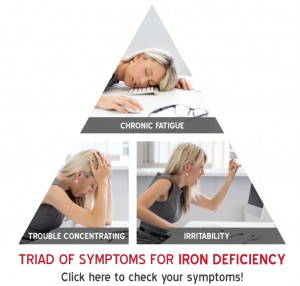Most of the time, your primary care physician will be the first doctor you see about iron deficiency. Depending on your symptoms, blood work results, and cause of your iron deficiency, you may be referred to a different healthcare professional or specialist.
Let’s take a look at which healthcare professionals may be involved in diagnosing and treating you…
Obstetrician/Gynecologist
Once detected by the primary doctor, females with iron deficiency may be referred to a gynecologist to help determine the cause of their iron deficiency. In other circumstances, women experiencing heavy menstrual bleeding, pregnancy or menopause may have their iron deficiency first detected by their OBGYN during a checkup.
Gastroenterologist
If a gastrointestinal disorder is suspected, your doctor may refer you to a gastroenterologist who can run tests to check you for stomach ulcers, celiac disease, Irritable Bowel Syndrome (such as Crohn’s disease or Ulcerative Colitis), and tumors in the digestive tract.
Hematologist
Your family doctor may refer you to a hematologist – a doctor that specializes in blood disorders including iron deficiency anemia – to help you manage your iron deficiency as well as any underlying issues (if any).
Cardiologist
Since iron deficiency can cause cardiovascular symptoms like heart palpitations, your doctor may refer you to a cardiologist to check for any possible underlying heart conditions. Iron deficiency is common in heart disease patients. Severe anemia constrains the heart from pumping properly and can lead to congestive heart failure and other heart conditions.
Registered Dietitian
In some cases, a registered dietitian can help you with your diet in order to help prevent iron deficiency and get the iron that you need from food (be sure to avoid common iron absorption inhibitors). This could be especially helpful for those with extra diet considerations, such as those who are gluten intolerant (celiac disease) or lead a vegan or vegetarian lifestyle in which iron-rich red meat does not exist in their diet.
Though your primary doctor may refer you to a specialist, don’t hesitate to ask for a referral if you feel that you need one or if you feel that your treatment isn’t helping. Being proactive about your health is always a good idea!
Are You Symptomatic?
If you suspect that you are iron deficient, please:
- Fill out this Symptoms Checker and take it to your doctor for proper diagnosis
- Understand what tests you can expect when diagnosing iron deficiency
- Be aware of the different oral iron formulations that are available and discuss which one is best for you in consultation with your doctor or pharmacist
Content and advice provided on The Iron Maiden is for information purposes only and should not serve as a substitute for a licensed health care provider, who is knowledgeable about an individual’s unique health care needs



Hello Leona, I’m having a terribly difficult time. My ferritin levels have been low for approximately 4 years (that I’m aware of). I used to work out a lot and I started feeling like I was walking around with blocks of concrete on my feet. I felt so heavy and everything I did became so difficult. My naturopath was the one who noticed that it was low. It sat at 22 which is in range of normal but she said not necessarily enough. She started treating me with an oral and it seemed to help. Over the past year though my hair has started falling out. It’s getting so bad now that I have balding spots; which for a female is hard to accept. Everyone has been saying that it’s alopecia so I was sent to a dermatologist. He said, “Use Rogaine and good luck”. After reviewing the blood work he had done for me I notice that my ferritin is at 23 again. Some research suggests that ferritin often needs to be at 40 for health of hair. I’m also terribly tired all the time and have a yellowing of the eye lids. I have a great deal of inflammation due to stomach issues which I understand isn’t helpful with absorption. I just can’t seem to get a doctor to pay attention. I think it’s not well understood in general medical practice. I had my physical yesterday and looked at my doctor’s monitor as she scanned the blood test results; I saw ferritin, once again, at 23 and held my breath that she might acknowledge it but she said, “Iron is acceptable”. There is just no point talking to her! I’m at a loss! I think my ferritin might be even lower than the tests suggest but at this rate I will be literally bald and dead of exhaustion with nobody to turn to. I don’t know if oral supplements will work. Do you think I would have any luck with Feramax versus a metagenics or some other iron supplement? Advice?
Hi Carla,
Thanks for your question. Normal ferritin levels are 20-300, however patients can be symptomatic of iron deficiency at levels less than 50. One common symptom is thinning hair; however, iron deficiency is not the only cause of this (general anesthetics, antibiotic use and lack of protein are just a few).
Additionally, ferritin levels are not a “gold standard” for assessing for iron deficiency, though it can never be “falsely low”, it may be falsely elevated by chronic disease or inflammatory processes. With the symptoms you described, it would be important to have additional lab work completed, specifically an “iron panel” (% Transferrin Saturation, serum iron and, Total Iron Binding Capacity).
Leona